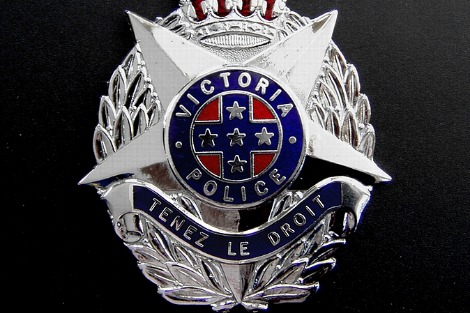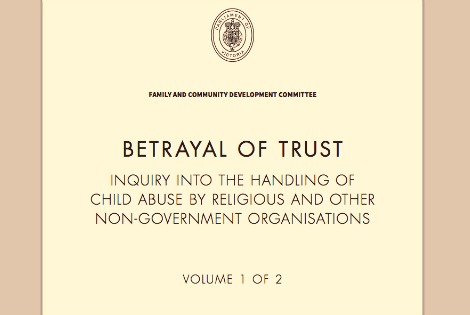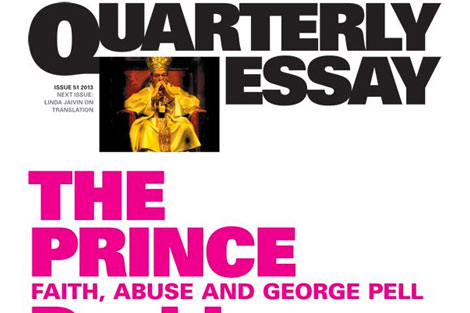Keywords: Clergy Sex Abuse
-

RELIGION
- Frank Brennan
- 26 November 2013
32 Comments
The Catholic Church hierarchy now seems more prepared to admit institutional and personal failures prior to 1996. They are yet to admit the pervasive, closed clericalist culture which infected the Church until at least 1996, but that will come. Let's hope that the Victorian police can also now move forward admitting past mistakes without manufacturing excuses which do not withstand the contemporary spotlight.
READ MORE 
-

RELIGION
- Moira Rayner
- 15 November 2013
22 Comments
If it happened then, it could happen now. Unless we take children seriously as people, it will. Unless individuals within the culture of their institution see it as a duty to stick their necks out and challenge its culture, it will. Unless bishops and archbishops and cardinals and religious supporting them take personal responsibility for protecting vulnerable people ahead of protecting the reputation of their institution, it will happen again.
READ MORE 
-

AUSTRALIA
- Ray Cassin
- 14 November 2013
10 Comments
If the Catholic Church is mentioned frequently in the report of the Victorian parliamentary inquiry into the sexual abuse of children, Catholics and their leaders can hardly complain. Among the churches scrutinised by the committee, only the Salvation Army has an even remotely comparable record of abuse. The Napthine Government should implement the inquiry's recommendations — with one exception.
READ MORE 
-

RELIGION
- Frank Brennan
- 12 November 2013
5 Comments
'Having thrown off the shackles of compulsion endured by pre-Vatican II Catholics, we relish that we come to the table not because we are forced, not because of social expectations, not because of the mindset of the mob, but because we are graciously called and freely responding.' Frank Brennan's Camino Address, Parish of Our Lady of the Way North Sydney, 12 November 2013
READ MORE
-

RELIGION
- Frank Brennan
- 08 November 2013
1 Comment
'Many Catholics wonder how we can maintain our Christian faith at this time in the wake of the sexual abuse crisis and the many judgmental utterances about sexuality and reproduction. The Church that has spoken longest and loudest about sex in all its modalities seems to be one of the social institutions most needing to get its own house in order.' Frank Brennan's address to the Yarra Institute for Religion and Social Policy, 8 November 2013.
READ MORE
-

RELIGION
- Frank Brennan
- 25 October 2013
2 Comments
'The Church should not give any appearance of hiding behind the corporate veil. Justice demands that present church leaders agree to satisfy any judgment debt against their predecessors or their deceased predecessors' estates when there is an allegation of past failure to supervise or adequately investigate a sexual predator in the ranks. Any damages should be paid from church assets.' Frank Brennan addresses the Australian Lawyers Alliance Conference, Rydges Lakeside, Canberra, 26 October 2013.
READ MORE
-

RELIGION
- Frank Brennan
- 24 October 2013
'Here is a pope who is not just about creating wiggle room or watering down the teachings of the Church. No, he wants to admit honestly to the world that we hold in tension definitive teachings and pastoral yearnings — held together coherently only by mercy and forgiveness.' Frank Brennan's Wallis Lecture presented in Hobart on 24 October 2013 and Launceston on 25 October 2013.
READ MORE
-

ARTS AND CULTURE
- Tim Kroenert
- 17 October 2013
20 Comments
Father Bob is cast in a similar mould to Peter Kennedy and Bill Morris, those other earthy Australian clerics who according to the popular narrative were suppressed by the hierarchy for flouting outdated practices. This is an appealing narrative for a secular public that has become disillusioned with institutional religion, especially due to the sexual abuse crisis and inequitable practices regarding marriage and the role of women within the hierarchy.
READ MORE 
-

RELIGION
- Frank Brennan
- 03 October 2013
18 Comments
'What a pope; what a man! ... The credibility of the Catholic Church has been enhanced with this new pope. We see in him many of the finest aspects of the presently battered and ageing Church.' Frank Brennan's presentation for Spirituality in the Pub, Pumphouse Hotel, Fitzroy, Vic. on 2 October 2013.
READ MORE
-

MEDIA
- Andrew Hamilton
- 26 September 2013
64 Comments
The limitations of Marr's account are the obverse of its virtues. It sifts Pell's motives and words but not those of his critics, and simplifies complexities. The details are designed to imply character. Churches are empty or full depending on the needs of the plot; Pell does not speak but booms. If a cock crows in a distant farmyard it crows for the Cardinal alone. This makes for engaging reading, but demands careful judgment.
READ MORE 
-

AUSTRALIA
- Frank Brennan
- 07 September 2013
12 Comments
How clever of you to choose the day of the federal election for me to offer these reflections. I come amongst you, not as a publisher or journalist but as an advocate in the public square animated by my own religious tradition as a Jesuit and Catholic priest engaged on human rights issues in a robustly pluralistic democratic society.
READ MORE
-

RELIGION
- Frank Brennan
- 04 September 2013
2 Comments
'The Towards Healing protocol is not a substitute for criminal prosecution of sex abusers. Nor is it a cheap alternative to civil liability for damages. It is a procedure available by choice to victims in addition to criminal prosecution of perpetrators or pursuit of civil damages for negligence by church authorities.' Full text from Frank Brennan's address to the Canon Law Society of Australia and New Zealand 47th Annual Conference, 4 September 2013 at Hotel Grand Chancellor Adelaide on Hindley.
READ MORE